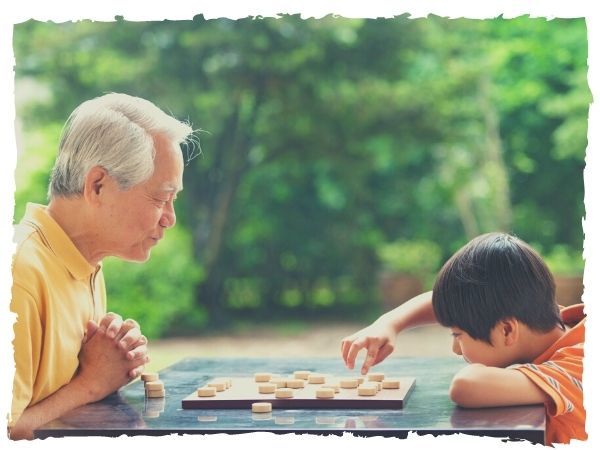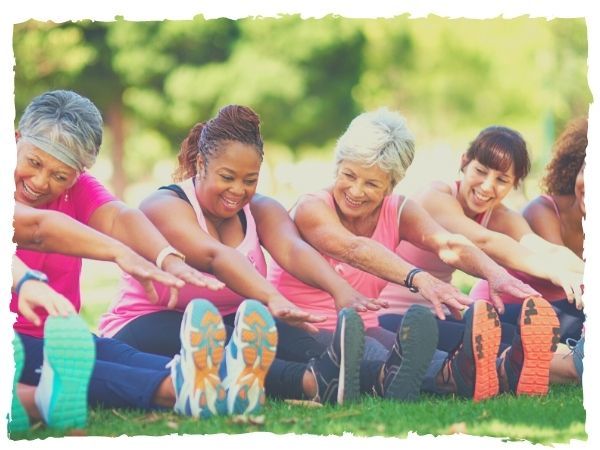Easy Methods for Seniors to View Grandkids
There might be affiliate links on this page, which means we get a small commission of anything you buy. As an Amazon Associate we earn from qualifying purchases. Please do your own research before making any online purchase.
The thought of going into retirement may seem like you're giving up a big chunk of your identity–but actually, quite the opposite is true. Rather than seeing retirement as being a time in which you're living with a weaker sense of purpose in life, think of it as a period where you have additional free time to use however you want.
One of the best ways to stay young at heart is to engage in activities that you really enjoy doing. Plenty of research has been done on the benefits of having a hobby, and its ability to support healthy aging certainly should not be overlooked.
People over 65 spend an average of 10 hours a day either sitting or laying down, making them the most sedentary age group. And while increasing health limitations can restrict one's ability to get out and do certain types of exercise, there are still hobbies that you can enjoy that can help you stay active.
The National Institute on Aging reports that there are many benefits that seniors can gain by devoting some time to doing an activity or engaging in a hobby. Some of these benefits include:
Depending on your interests, there are a lot of options seniors have when looking for a hobby or new activity to enjoy.
In this article, we will look at 37 fun hobbies and activities for seniors that are laid-back and easy to enjoy. But first, let's look at some tips for finding the right hobby for you or your aging loved one.
What You Will Learn
- How to Find the Right Hobby
- 51 Fun Hobbies and Activities for Seniors
- 1. Writing
- 2. Volunteer
- 3. Learn How to Play an Instrument
- 4. Walking
- 5. Join a Book Club
- 6. Gardening
- 7. Be a Citizen Scientist
- 8. Genealogy
- 9. Bird Watching
- 10. Crafting
- 11. Play Games
- 12. Play Solo Games
- 13. Perform
- 14. Teach
- 15. Swimming
- 16. Care for a Pet
- 17. Yoga
- 18. Photography
- 19. Learn Origami
- 20. Go to Museums
- 21. Learn a New Language
- 22. Interact With Neighbors
- 23. Create a Ship In a Bottle
- 24. Golfing
- 25. Study Philosophy
- 26. Learn Self-Defense
- 27. Couponing
- 28. Chess
- 29. Listen to Podcasts
- 30. Stargaze
- 31.Keep a Journal
- 32. Practice Tai Chi
- 33. Make Bread
- 34. Watch Documentaries
- 35. Start a Collection
- 36. Fishing
- 37. Barbeque
- 38. Candle Making
- 39. Camping
- 40. Snorkeling
- 41. Traveling
- 42. Woodworking
- 43. Video Games
- 44. Open an Etsy Shop
- 45. Shelling
- 46. Bowling
- 47. Outdoor Shows
- 48. Calligraphy
- 49. Table Tennis
- 50. Pottery
- 51. Crocheting or Knitting
- Final Thoughts on Hobbies for Seniors
How to Find the Right Hobby
Whether you're a senior who is looking for something new to do or you know someone who is among the 25% of people over 65 who are socially isolated, you will be able to find a fitting hobby much more easily if you consider your (or their) interests and what you want to get out of a pastime.
For example:
Mobility limitations and impairments may limit seniors from looking for a new hobby or activity to get involved with, however, this can result in reduced social interaction, cognitive stimulation, and physical activity, which can lead to rapid mental and physical regression and a higher susceptibility to developing age-related diseases. Engaging in a hobby can hinder the development of age-related ailments and help promote a positive attitude about life.
It's perfectly fine if you start a hobby and realize it's not right for you. Keep up your determination to find an activity that suits you and things will eventually fall into place.
Here are 51 suggestions to get you started.
51 Fun Hobbies and Activities for Seniors
1. Writing
Writing is one of the best indoor hobbies you can take up. You can choose to write about anything that you want, from creating a work of fiction, writing poetry, or even writing about your life's achievements. No matter what you decide to write about, this hobby is a great way to find a sense of meaning and fulfillment in life.
This is a beneficial hobby for seniors because writing helps stimulate the brain and it keeps your mind sharp. In fact, a study done by the American Academy of Neurology found that writing can prevent age-related brain shrinkage and reduce the rate of memory decline by 32%. Furthermore, writing helps keep hand-eye coordination skills in good condition, which is an important part of reducing your risk for falls.
Writing can be a great creative outlet for seniors, whose experiences through the years can also serve as a substantial source of knowledge to help younger generations prepare for their future.
2. Volunteer
One hobby that seniors often take on is volunteering. In fact, in 2018, the Corporation for National and Community Services found that seniors contributed 2.2 billion hours of volunteering in the U.S., which made up for a little over 30% of all volunteer service in the country.
One reason that volunteering is a great option for seniors is that, according to studies , seniors who volunteer experience lower rates of depression, higher levels of overall well-being, and even reduced mortality rates. Volunteering can help reduce stress, offer a sense of accomplishment, and help improve seniors' confidence and sense of purpose as they transition into retirement.
There are endless opportunities to give back to your community, many of which allow for you to socialize with people who share similar interests. One volunteer opportunity that many seniors take on is tutoring elementary students with their reading, which also helps seniors play a rewarding mentoring role. Another volunteer option could be at a local arts center where you may be able to benefit from free admission to performances and galleries.
Whatever you choose, organizations are often more in need of people's time than they are money, so finding an organization or position that is important to you and getting involved can be an invaluable gift for others.
3. Learn How to Play an Instrument
Retirement is a great time to learn how to play an instrument, and an increasing number of seniors are reaping the benefits of incorporating more music into their lives. Learning how to play an instrument requires the use of multiple areas of the brain in addition to hand-eye coordination and fine motor skills. Furthermore, if you can find a group of people to play music with, you can increase your social interaction, which can help boost your emotional well-being.
Many community centers offer music classes that are made for seniors, allowing older adults to interact with each other while sharing their love of music. Some common instruments that seniors learn how to play include the ukulele, harmonica, and piano, as these instruments are easy to learn, require less mobility than others, and don't require a large financial commitment (unless you're buying a piano).
Playing and listening to music can have a positive impact on seniors' emotional health and wellbeing while reducing stress and anxiety. (Sidenote: Here are more hobbies for people with anxiety.)
Organizations such as the NAMM Foundation offer programs for people of all ages and abilities to support music-making and its ability to allow people to be creative while using all parts of their brain in collaboration. Through creative inspiration and unspoken communication, learning how to play music is a unique hobby that offers benefits to people of all ages.
4. Walking
A great way for older adults to get some exercise is to go for walks. Whether this is something you want to do alone to give you some time to engage in self-reflection while walking at your own pace, or you want to grab a walking buddy to socialize with, this hobby undoubtedly offers a ton of mental and physical health benefits. Some benefits to taking a friend along include:
Walking for exercise can help seniors live independently for longer, but it doesn't have to be strenuous in order to offer benefits such as these. Whether you're going for a long walk at a steady pace or you do some shorter bursts of speed walking or walking through hills, this hobby allows you to gain the benefits of being outside while also keeping your body in top physical shape.

There is a low barrier to entry for this hobby, as all you really need is a good pair of walking shoes. And don't let it stop you from taking up walking as a hobby if you use a cane or a walker. You can use these tools to help improve your balance and reduce the amount of weight that you're putting on your joints–because that's what they're there for!
5. Join a Book Club
If you enjoy reading, you can make the experience even more rewarding by joining a book club. Book clubs always include some socializing during the meetings, which will help you get to know new people in a laid back setting. This hobby can also help you relate to others as you talk about whatever book that has been chosen, and it may help you understand the book better to get different people's perspectives on it.
Joining a book club can also introduce you to books that you wouldn't otherwise read, which may help you uncover an interest you didn't know you had. This is also a great option for a hobby because it's inexpensive–or free if you are a member of a local library.
Whether your book club reads fun books and has relaxed discussions, or they focus on more serious books with more intensive analyses, simply getting together with others on a regular basis will be fun.
6. Gardening
Doing some work in the garden is a great way to stay active during your golden years. While you may not think of it as such, gardening is an effective low-impact workout that uses muscles from head to toe, plus it gives you the added benefit of being outside.
Studies have shown that gardening for just half an hour a day is a great way for seniors to meet their body's physical activity needs. This activity can help reduce your blood pressure, improve your mood, increase your body's levels of vitamin D, and help decrease stress.
Many neighborhoods or counties also have garden clubs where people who enjoy gardening come together. Garden clubs do various things such as hosting flower shows and giving garden tutorials for projects that aim at bettering the landscape of your community. Garden clubs help people share knowledge, meet other gardening enthusiasts, and learn new things about the craft.
7. Be a Citizen Scientist
This is a unique hobby that many people may not be aware of! Often, organizations need help with observing and analyzing people's surroundings–and as long as you have access to a computer, you can engage in this fascinating hobby!
A citizen scientist is someone who participates in scientific research in collaboration with organizations to increase knowledge in some way. Through this practice, people can share information and contribute to various data monitoring and collection projects and programs. Scientists and researchers work with citizen scientists to help advance what we know about the world through data that can be gathered by citizens.
Citizen scientists come from various backgrounds and have a wide range of expertise, but modern technology has allowed this practice to be very accessible and valuable for today's research practices. Some examples of projects for citizen scientists include wildlife-monitoring, water level observation, bird and nest observation, air quality monitoring, and analyzing images of specific forests, etc.
Zooniverse, a web portal operated by the Citizen Science Alliance, is the largest platform for this practice, with over a million citizen scientists worldwide who focus on subjects such as climate, language, medicine, and social science. Much of the information gathered by citizen scientists would not otherwise be practical to gather, which would abandon the opportunity for new discoveries and useful sets of data that are used by the research community.
8. Genealogy
With so many online resources available, genealogy has perhaps become more popular than ever. Researching one's family history is a great pastime to help improve cognitive function and could even introduce you to some distant relatives you wouldn't otherwise meet.
This is a popular hobby that can mostly be one in the comfort of your own home. Learning about the stories, connections, and names of your ancestors can help spark discussions with other family members, regardless of their age.
There are a handful of ways you can look into your family's history online on sites such as Ancestry.com and FamilySearch.org. You can also look into your background by ordering a test kit from 23andme.
9. Bird Watching
Many people who once enjoyed hiking and camping still want to spend time outdoors, but without the pressure of moving quickly on a hike. One option that retirees often find joy in is bird watching because it allows people to enjoy the outdoors and go for a walk at their own pace while still being mindful of their surroundings.
You can still travel to your old hiking spots to go birding, or you can stay closer to your home. You can also choose to go by yourself or go with a group to add some socialization into your day.
With birds' unique voices, feather patterns, colors, and various behaviors, birds allow people to connect with nature and their local ecosystems by watching them. If you pick up this hobby, you may start to pay more attention to other things in nature as well.
Finally, this is an excellent hobby for seniors because it allows you to exercise your reflexes while you focus on the bird and try to identify its species.
10. Crafting
Art therapy is a common form of treatment used for seniors to help decrease their anxiety and increase their hand-eye coordination. Some psychologists have even compared the impact of doing crafts to the calming effects of meditation. This means that seniors may find it therapeutic to create crafts such as knitting, painting quilting, or clay making.
There are frequently clubs associated with such crafts. Quilting enthusiasts have gotten together for generations to trade patchwork, ideas, and new patterns. Some organizations such as The Modern Quilting Guild host national events, however, there are also smaller clubs on a more local level that you can likely find at a senior center near you where all skill levels are invited to participate.
If you feel more connected to painting, this hobby is often used in therapy and recovery. Working with watercolors, oil paints, and other types of paint to create art can inspire playfulness, improve focus, and help seniors focus on their hand-eye coordination, making this a great creative hobby for seniors to engage in.
11. Play Games
Finding others to play games with is an effective way to improve socialization. Engaging in friendly competition through games like bridge and chess with friends or at a senior center can help keep social anxiety at bay by keeping retirees connected with a common hobby. Having a group of friends to regularly play games with can reduce symptoms of depression and feelings of loneliness.
Playing board games also offers many health benefits, such as stress relief, reduced memory loss, and reduced symptoms of depression. Playing board games can enhance memory formation and help keep cognitive function sharp, plus they tend to be calming, which can relieve stress and reduce blood pressure. Finally, games often require the use of fine motor skills and coordination, which is an important practice for older adults.

For example, playing chess has a lot of benefits for seniors. Chess helps seniors in many domains of their lives because it engages problem-solving skills, dexterity, and helps build social relationships. Playing against various opponents and analyzing moves lets seniors make new friends while also enhancing their skills.
12. Play Solo Games
You don't have to have a group of people together to benefit from playing games. Many seniors enjoy doing crossword puzzles, putting together jigsaw puzzles, and doing sudoku. These games can help improve memory, release stress, and improve mental health.
Doing crossword puzzles has been a popular activity for seniors for years, as they help keep the mind sharp because they require the use of one's memory to find the answers to clues by referring back to their knowledge and vocabulary. Crossword puzzles are also easy to come by, as they can be found in newspapers, magazines, and online.
There are many benefits to doing jigsaw puzzles, most of which lie in the fact that completing them requires your full attention. Some of these benefits include:
Playing Sudoku has similar benefits to the games mentioned above. This game also helps improve logic and concentration, promote a healthy mindset, reduces stress, and gives players a sense of accomplishment.
One of the great things about all of these games is that they're inexpensive and easily accessible.
13. Perform
Performing in any way can help seniors improve their memory and attention span in addition to being an emotional outlet. Whether you choose to perform through acting, dancing, or singing, these are fun ways to stay social with other seniors who are also looking for a creative hobby.
Senior centers often have community theaters in addition to various types of performances, dancing lessons, and even play reading groups that you can explore.
Dancing in itself has several benefits, including:
14. Teach
What was your profession before retirement? Or what have you been passionate about for your whole life? Whatever knowledge you've gained throughout your life, you can teach it to those who are just getting started.
There are many adult education programs that hire evening instructors to teach part-time about hobbies such as cooking, speaking a second language, and sewing. Teaching about something that you really enjoy can not only be fulfilling, but it can also help bring in some extra cash.
15. Swimming
If you live close to a gym that has a pool, taking swimming classes can be great for socialization and for your physical health. Getting some exercise is beneficial for seniors because it can help improve heart health, increase flexibility, and help maintain muscle strength. Exercise can also reduce one's risk of becoming injured and improve mood and cognitive acuity.
Swimming is especially great for seniors because exercising in the water helps people get into shape without adding stress on the body. Swimming is gentle on the joints and classes are fun, as the instructors are often enthusiastic and play high-energy music.
Water exercises help engage all of the body's muscle groups, providing a comprehensive workout. Here are some specific health benefits that seniors can get from swimming:
16. Care for a Pet
Because loneliness is something that many seniors face that can lead to depression, having a pet can offer companionship and give seniors more chances to get up and move around. The good thing about many breeds of dogs is that they mold their schedule to yours, meaning they're never too busy to be by your side. Plus, if you get a smaller dog, you can easily take him along with you if you travel.
Having a pet can also help keep seniors in a routine. While caring for a pet is a responsibility, it doesn't have to be extremely difficult. The routine of feeding and walking a dog can give seniors a sense of purpose and structure in their days.
Finally, caring for a pet can help you stay connected to the outside world, as you will need to take him to the vet, the groomers, and walk him along with other people walking their dogs.
17. Yoga
You certainly don't need to be in your 20s to practice yoga. This form of exercise is a great way for people of all ages to increase their flexibility and balance and maintain muscle strength. Seniors can especially benefit from practicing yoga because the breathing portion of this exercise helps increase lung capacity in addition to training the body to relax though intentional breathing.
There are a lot of styles of yoga that you can choose to practice, but it may be best to contact a yoga studio before attending a class to ask if they have instructors who are specially trained to work with seniors. Instructors who are knowledgeable about working with seniors have a better understanding of the appropriate intensities of the poses and the most effective mobility modifications.

Practicing yoga can help you feel relaxed, while also giving you lasting energy. And, doing yoga with a class can help you be a part of a group of like-minded individuals who also want to stay physically fit. All you need to get started is some appropriate clothing and a yoga mat (which is often provided by the studio).
18. Photography
Not only will taking up photography help you get outside and want to explore new places, it can also greatly benefit your cognitive function. One study found that seniors who have a sustained sense of engagement in learning skills that stimulate their working and episodic memory have enhanced cognitive function when compared to those who don't. The study specifically looked at seniors learning how to do digital photography.
Photography also teaches seniors to use their creativity as they look around for new things to capture photos of. This can then lead to the exploration of different backgrounds, correct lighting, people's expressions, etc.
Seniors may choose to take candid photos of family members, nature, or everyday sceneries. Even food photography has gained a lot of popularity. Starting a collection of your pictures and showing it off to others can also give you a big sense of satisfaction and a boost of dopamine.
19. Learn Origami
Origami is a type of art that really focuses on dexterity and fine motor skills. This low-cost hobby can help you create decorations for your home and decorations you can add to gifts or birthday cards.
While origami looks like it's really difficult, it's easy once you get the hang of it. Making origami is a great way of expressing yourself, be creative, and keep you engaged. Furthermore, research suggests that doing origami can help seniors improve various medical conditions.
Origami stimulates the brain as your hands are creating shapes by making simple folds.
This art is often used as an activity in senior centers, and specific modified Origami figures are taught to those who are suffering from Alzheimer's because creating them can improve mental acuity, focus, and cognitive skills.
Doing Origami can also be relaxing and boost your self-esteem as you can gain a sense of satisfaction after creating new shapes. Furthermore, it can help improve a person's 3D comprehension skills, imagination, and motivation to create new creations.
The only material that is needed is paper, and this hobby can be done anywhere. It can be done alone or with family, and seniors can even teach their grandkids how to make shapes with paper beyond paper airplanes, such as birds, fish, frogs, and flowers.
20. Go to Museums
Going to museums can be very interesting and it allows you to get some walking in for the day. Recent research has found that seniors who visit museums on a semi-regular basis report to have better mental and physical health than those who don't.
Furthermore, those who create their own art and attend museums report lower rates of hypertension and better mental and physical functioning than seniors who neither create nor seek out art exhibits. Seniors who go to museums also experience reduced decline in cognitive and physical functioning. In these studies, cognitive health was measured by seniors' own reports of memory and cognitive functioning, physical ability was measured through limitations in physical activity, and heart health was measured through self-reported rates of hypertension and blood pressure.
A recent survey has shown an increase in seniors' attendance at museums over the past decade, however, not all seniors have access to museums where they live. For those who have physical or cognitive limitations or a lack of access to art venues, it's important to seek out these local opportunities to explore art, as there are often smaller exhibits that people can attend.
21. Learn a New Language
It's never too late in life to learn a new language, and doing so can boost cognitive function and delay the onset of Alzheimer's disease. In fact, research has shown that seniors who are bilingual show symptoms of Alzheimer's an average of four years later than those who only speak one language. The researchers behind the study further concluded that being bilingual could potentially be one of the most effective tools in the fight against dementia–even more so than prescription medicines.
It can be exciting to learn a new language, as you can gain the ability to communicate with people who come from a very different background. You will also gain an appreciation and understanding of another culture and their values and belief system.
If you want to put your knowledge of a new language to use, there are many opportunities for seniors to study abroad, where you can go sightseeing and interact with locals while continuing to learn the language. This is a great excuse to travel and see the world while also embracing lifelong learning!
22. Interact With Neighbors
Do you live in a neighborhood that is conducive to interaction with those around you? If you live in an extremely rural area, this may not be the case, but many living situations offer the benefit of having neighbors close by.
Studies show that 61% of Americans are friendly with their neighbors, and interacting with them is a great way to socialize with the people living around you. There are probably families living in your neighborhood that come from a wide variety of backgrounds, but you all have the commonality of living where you do.

Socializing with your neighbors will make you feel more involved in your community, so if you don't know them yet, walk around on a nice day when people are presumably spending time outside. Interacting with your neighbors is also practical because it offers some extra home protection. As you get to know them, they will see your regular daily routine–which means they will be able to notice if an unknown person is lurking while you're not home.
Resource: Check out these tips for meeting your neighbors.
23. Create a Ship In a Bottle
Because aging is associated with the loss of fine motor skills, picking up hobbies such as creating a ship in a bottle is a great way to practice keeping these important skills intact. Maintaining your strength and coordination in the small muscles in your hands will help you continue to complete everyday tasks independently, such as eating, writing, or just changing the TV channel.
Creating a ship in a bottle is a classic hobby that leads to a final product that will amaze people as they try to imagine how you got this big ship onto such a small bottle.
This hobby requires a steady hand and dedication, but is definitely something that you can focus on for hours as you create your masterpieces. And, you don't have to stick with just ships– there are a ton of other intricate things you can make inside of bottles..
Resource: Here is a guide to help you with building a ship in a bottle.
24. Golfing
Golfing is a great hobby for those in retirement, as it encourages socialization. Seniors who take up golfing as a hobby usually stick with it because it helps improve concentration and it boosts one's quality of life. Furthermore, studies have suggested that playing golf improves seniors' walking and standing ability, in addition to their strength, balance, and cognitive function (because it requires players to pay attention and remember their score).
Spending some time on the course will always offer you a chance to experience some friendly competition against your friends and yourself. One of the best things about golf is that you can always work to improve your own game and beat your last score.
Resource: Check out this video to learn the basics of playing golf.
25. Study Philosophy
At this point in your life, you've probably stopped to think about the purpose of your whole journey at some point. Well, as it turns out, trying to answer this question is a great hobby in itself. Studying philosophy and uncovering what you believe are various "truths" about life and why we are all here is an interesting and thought-provoking pastime that can help you always have a conversation starter in your back pocket.
As you're learning about philosophy, you will use logic and reasoning skills to understand various points of view regarding the origins of life. There are a lot of books you can look into to help you get thinking about philosophy. And, once you start to learn a bit about this topic, you'll realize how much fascinating information there is to sort through.
Resource: Here are six tips to help you get started with studying philosophy.
26. Learn Self-Defense
Unfortunately, statistics show that the rate of criminal activity against seniors is on the rise. Because of this, it's important for seniors to be confident in their ability to defend themselves in the case of an emergency.
Learning self-defense offers a wide range of physical benefits such as improving your balance, flexibility, coordination, strength, and endurance. Hopefully you won't have to use the self-defense techniques that you learn, but knowing them is important in case you ever need to escape a threat, and practicing them will give you some great exercise.
Practicing self-defense will teach you to get in the habit of being aware of your surroundings so you can prevent an attack from happening in the first place. It will also reduce your chances of becoming a victim because you will learn to make safe choices to protect yourself and your loved ones.
Resource: This video offers some self-defense tips for seniors.
27. Couponing
With a limited income, many seniors are on a tight budget, which makes couponing a very practical hobby. You can do some work before your shopping trips by finding and organizing your coupons to save on everyday purchases. This hobby can help you save a significant amount of money in the long run if you figure out when sales are and how to spot a great coupon.

After getting started with this hobby, you will be able to save money even without coupons because you will start to recognize how much an item usually costs, where to get the best deals, and when the best time is to stock up on your normal purchases.
Resource: This video will help get you started with couponing.
28. Chess
You can play chess any time, whether you're with someone or home alone. With a smartphone or computer, can you play against a virtual player or someone else living anywhere else in the world who is looking for a chess partner. This game of strategy will help you maintain your cognitive health no matter how you play.
Chess offers seniors an endless challenge with unlimited winning strategies to learn. You can help keep your mind active and improve your cognitive function as you use your problem-solving, memory, and analytical skills to make the most strategic decisions to win the game. Focusing on this game will also help you escape your everyday problems as you're trying to plan a few moves ahead and predict what your partner will do next.
Resource: This introductory video will help you learn the basics of playing chess.
29. Listen to Podcasts
Podcasts can inspire seniors to start this new sector of their lives in a positive way. Plus, they can help listeners stay on top of current global events. Podcasts are great for personal growth and can encourage people to create and achieve goals during their retirement years. Podcasts can even help seniors look at their life's problems in a new light, and potentially come up with new ways to address them.
There's a podcast out there for anyone with any kind of interest. Whether you like to follow current financial trends or you want to learn something new, it's easy to find podcasts on any topic that you want. Also, since podcasts are free, this is a great cheap hobby for seniors on a budget.
Listening to podcasts can offer seniors an escape from their routine, engage in lifelong learning, and cater to one's mood. Whether you want to listen to something funny, suspenseful, or educational, there is a podcast out there for you. Once you find your favorite show, listening to it will make time fly by.
Resource: Here are the 8 best podcasts for seniors.
30. Stargaze
This outdoor hobby doesn't require a lot of energy or experience. All you need to enjoy this inspirational hobby is a clear sky and a blanket or chair.
Astronomy is a science that can inspire seniors to look out into the universe and contemplate the infinite mysteries out there.
Find a comfortable spot on a starry night where you can just look up. You don't need any special equipment–just your eyes–to get started. Plus, this is an activity that you can do no matter where you are in the world. And you don't need anything expensive to start–but you'll likely end up wanting to buy it!
Resource: This guide can help you get started with stargazing.
31.Keep a Journal
Keeping a log of your daily comings and goings may seem a bit pointless in the moment, but it can be a very useful tool to look back on in the future, and it can be an invaluable treasure for future generations to read.
One of the benefits of journaling as a hobby is that it is something you can pick up and do anytime–whether you decide to do it daily or simply when the mood hits you, there are a lot of advantages to this activity. For example, it can:
Resource: Here is a list of journal prompts for seniors.
32. Practice Tai Chi
This ancient martial art involves slow, flowing body motions that are designed to create an overall meditative experience as it promotes deep breathing and releases endorphins. Tai Chi is a great form of exercise for strengthening your muscles from head to toe and toning your body using relaxing movements.
Because this form of exercise doesn't put a lot of direct impact on one's joints, it's great for seniors who may have pain in these sensitive areas. However, it still improves balance and stability because it helps strengthen the small muscles in your ankles and knees. Furthermore, practicing Tai Chi can help relieve anxiety and relax your mind in only 20 minutes per day.
Resource: Here are three easy Tai Chi videos for seniors to help improve strength and reduce the risk of falls.
33. Make Bread
Who doesn't love fresh, warm bread straight from the oven? More and more people are taking up bread making as a hobby since the covid pandemic has reminded us that going to the grocery store and just picking out whatever we want is a modern-day luxury. Plus. homemade bread is much healthier than processed bread from a factory.

There are a lot of different types of bread that you can experiment with–and this is a hobby you can pass onto younger generations once you get the hang of the technique. You can incorporate your homemade bread into all of your meals by using it to make sandwiches, toast, croutons, or even bread pudding!
Resource: This video shows one process you can use to make bread.
34. Watch Documentaries
It's never too late to learn more about something, and documentaries are a perfect way to do this because they offer entertainment plus learning together in one activity. Documentaries are often fascinating and reveal more about a subject than you ever would have imagined. Documentaries also help keep your brain active and give you something to talk about with friends and family.
You can find documentaries on YouTube for free, and your local library probably has a lot of documentaries on DVD. You can also find them on Netflix or whatever streaming TV service you have. Watching documentaries is a great way to help you develop a "well-rounded" knowledge base instead of only specializing in one or two topics.
Resource: Here is a list of some of the highest-rated documentaries to choose from.
35. Start a Collection
Maintaining a collection is a great recreational activity for seniors. Whether you're collecting something because you're passionate about it, or it has potential monetary value, collecting offers a mix of one's interests and an opportunity to interact with others who share your passion.
There are a lot of places you can shop online for unique things that other people are selling. No matter how eccentric your target object is, there's other people out there who are also interested in buying, selling, and trading it. This hobby fulfills the ancient human desire to hunt for things to complete a collection.
The thrill is in the chase–whether it's coins, stamps, comic books, or anything else, keeping a collection can be a great hobby for seniors.
Resource: This video offers a "how to" on starting a collection.
36. Fishing
Going fishing is a great way for seniors to relieve some stress and have fun at the same time. Spending time enjoying being out in nature while fishing is a great way for seniors to leave their everyday life behind, breathe in some fresh air, and relax while enjoying the endless scenery.
While fishing was once a requirement for human survival, the activity remains popular among people of all ages. When you're fishing, you will be exercising and acquiring some new skills such as patience, goal-setting, and fine motor skills as you're waiting to feel that tug on your rod, aiming to catch more fish than your partner, and baiting your hooks. All of this will help you feel a sense of accomplishment.
People enjoy the process of fishing because of the opportunity to bond with other fishermen, experience the anticipation of reeling in a fish, and maybe even provide a fresh, healthy dinner for the family.
Resource: This is a helpful beginner's guide to fishing.
37. Barbeque
If you've never learned how to smoke meat or use a charcoal grill, now's the time. With this hobby, you will always have a reason to get your kids and grandkids together for a fun Sunday night dinner. This hobby is inexpensive to maintain because once you buy a grill or smoker, all you need to get is the ingredients each time you want to use it.
You can experiment while working with different tools, methods, and cuts of meat. You can even get creative working with spices and vegetables to make an entire meal hot off the grill. Taking up this hobby will make those unforgettable nights with family and friends all the more memorable.
Resource: This video demonstrates the perfect method for grilling meat.
38. Candle Making
Compared to buying candles, making them can be a form of therapy. And you can create eco-friendly, cruelty-free candles by using soy wax and cotton braided wicks. This can give you a way to live by your values and have a sense of meaning in your life.
Another reason to make candles could be to sell them. You can influence people in a positive way with any natural scents, colors, and designs you use. Candles can be uniquely shaped and personalized. And you'll be making money too. If you'd rather not start a business venture, you can make candles for the pure pleasure of it. When you're done, you can light one and forget about any worries you may have. Furthermore, try lighting candles to create a calm environment for meditating.
39. Camping
Camping in the great outdoors can be full of opportunities for improving your health. For example, you can socialize, get fresh air and sunshine, eat delicious food and get a good night's sleep. You might catch sight of a bear, birds, deer, and other wildlife. And you won't have to take a trip across the world to escape your hometown.

Of course, you could camp near where you live or consider heading to another scenic area. In Big Bend National Park, Texas, you can go hiking, canoeing, or rafting. On the other hand, Arches National Park, Utah is full of bright red rocks that are as pretty as a picture. You can use your time away to record your memories by taking photos, drawing pictures, or writing in a journal.
40. Snorkeling
If viewing the underwater world is on your bucket list, then you might want to try snorkeling. Snorkeling is good for cardiovascular health since it makes the heart muscle stronger and increases the heart rate. By the same token, you can get some exercise, burn calories, and lower stress.
Before you venture out into the unknown, you can take a snorkeling class for beginners. This way, you can fully immerse yourself in the rare experience of catching a glimpse of the vast array of colorful underwater creatures and ocean landscapes. To be sure, snorkeling can be sort of similar to going on a safari, except it's underwater.
41. Traveling
When you have the itch to get away from home, you might want to travel abroad. Doing so can encourage you to get out of your comfort zone and try new experiences. Further, you can become more open-minded as you explore a different city or head to the countryside. Exposing yourself to unique cultures can inspire you to taste a new cuisine, talk to people you've never been exposed to, and see beautiful places most people only dream of seeing.
Whether you'd like to stay active or just relax, there are a plethora of places for you to discover. You can go on a Caribbean cruise, go on an ideal Oahu tour in Hawaii or explore the countryside in Italy. Other destinations you might like to visit are Bangkok, Thailand, Machu Picchu, Peru, Montreal, Canada, and Tulum, Mexico, among others.
42. Woodworking
On the one hand, having woodworking as a hobby can make you less likely to be mentally impaired down the road. Moreover, creative activities can promote healthy brain aging. Woodworking can also enhance skills, boost your mood, decrease stress and anxiety, and improve math skills.
Beginners and advanced woodworkers can appreciate creating floating shelves, a magazine rack, a planter box, and other projects. After you've finished, you can give your project away as a gift or keep it for yourself. This hobby can be distinctly gratifying, especially since seeing a completed project you made yourself can boost your self-confidence. Before you know it, you'll have something practical to use every day or whenever you need it.
43. Video Games
Playing healthy video games in moderation can be a smart way to entertain yourself and stay active and alert. You can find games for single or multiple players. Asking one or more buddies to join you can make your gaming days extraordinarily exciting, while playing by yourself can help stave off boredom and brighten your day. You can even invite your grandkids over to join in the fun. Just remember to have your gaming console ready, because children and even adults can hardly resist a video game challenge. Since playing video games can be addictive, it can be important to remember to take breaks when necessary.
There are a variety of video games out there to keep you occupied. For instance, Wii Sports can give you a way to get some exercise and stay energized. Playing Super Mario 3D World can stimulate your imagination and hippocampus. The hippocampus is a key part of our brains that retains memories and taking care of it can help lower the risk of Alzheimer's and other serious illnesses. Other video games you might like to try are World of Warcraft, Minecraft, and Animal Crossing: New Leaf. On top of that, mobile games like Candy Crush, Wordscapes, Two Dots, Words with Friends, and Lexulous can be nearly impossible to put down.
44. Open an Etsy Shop
We'd all like additional spending money and you're probably no different. Instead of worrying about how you'll use your time, you might want to try making money in a way you enjoy. One way to do this could be to open an Etsy shop. You can look online by going to Etsy.com to see all of the ways you can start a business. While you likely won't become rich with this venture, you can earn money by doing a favorite or new hobby.
Etsy gives people an opportunity to make and sell everything from dolls to artwork. After all, you might be one of the lucky ones that brings a personal touch to everything you make. This can give you purpose and meaning in your day-to-day life. Buyers can gain comfort from purchasing the items you lovingly made. Plus, you'll be using your own creative ideas to make something truly worthwhile. And creativity can provide you with stress relief, improved self-confidence, and a greater sense of accomplishment and freedom.
45. Shelling
Shells are symbolic of prosperity, healthy and positive relationships, and good communication. Two of the most common types you'll see washed up on beaches are bivalves and gastropods. You can learn to identify other types by reading a book on the subject or studying other resources. Getting deeply involved in your hobby can be fulfilling. Searching for seashells on the beach might sound like an ideal activity. You might imagine the sun on your skin and a light breeze blowing through your hair. If you've never tried shelling, you'll likely find it to be rewarding and relaxing. You'll be able to focus on the feelings of nature all around you as you explore the warm sand beneath your feet.
Besides seashells, collectors look for other objects that may have washed ashore. This could be shark teeth, driftwood, sea glass, or something else. You never know what you might discover. The water and sand are filled with mysteries and possibilities. This astounding fact could hold your interest for a long while. After you've collected your shells, you can incorporate them into arts & crafts projects or make splendid decorations out of your findings. Another idea is to take vivid photos and then give the shells back to nature.
46. Bowling
While bowling might not make you a deeper person, it can be immensely enjoyable. In addition, this activity can improve circulation, increase bone density, and lower the risk of diabetes, heart attack, and stroke. If truth be told, staying healthy might give you a reason to head to the bowling lanes.

You can bowl with a group or go solo. No matter what, it's almost guaranteed you'll have the time of your life. You'll be boosting your brainpower and spending time with people you care about. If you find you love this popular sport, you can even bring your own ball next time.
47. Outdoor Shows
When staying indoors becomes dull, you might want to try attending an outdoor show. This can give you a chance to socialize in an exciting setting, enjoy a nice day, and see what's out there. And you won't have to feel stuck watching TV and doing other unhealthy activities.
For one, outdoor arts & crafts shows feature unique displays by new and professional artists and lively activities. Oftentimes, these artists sell their work to spectators. This means you can purchase a creation and hang it on your wall at home if you want to. There are also outdoor theater showings, music performances, and classic car shows.
48. Calligraphy
Creating lovely letters on paper can have an astounding effect on a person. In the first place, calligraphy is relaxing and therapeutic. Doing this activity can be a meditative experience as you focus on making strokes of ink. You can forget about your problems as you use your hands to get creative.
You can write absolutely delightful letters to loved ones by doing calligraphy. Likewise, you can create wedding invitations and cards. Consider selling your calligraphy to people who genuinely appreciate your graceful handwriting. Practice makes perfect and you can get started on your creative journey by using a calligraphy kit for beginners.
49. Table Tennis
It might be surprising that playing such a simple game as table tennis could be beneficial to your health. In actual fact, it's a social sport that improves hand-eye coordination, enhances reflexes, improves balance, maintains brain sharpness, burns calories, and can be therapeutic for those with dementia. And table tennis is easy on the joints, so you can amuse yourself without the risk of serious injury.
Table tennis can provide you with a physical and mental challenge like no other game. You can put this game indoors in your own game room or try joining a club. Either way, you might never get bored of competing with a friend or family member and endlessly hitting that ball with your paddle.
50. Pottery
Making something aesthetically pleasing with your own hands can help you express yourself artistically. What's more, pottery can be tremendously therapeutic. This activity can be a significant mood enhancer, enhance focus, decrease stress, and give you a sense of accomplishment.
Creating sculptural pieces that are exceedingly functional and beautiful can be satisfying for the potter. By learning the skills of an expert, you can gain self-confidence. Over and above that, your creations don't have to be perfect for you to be pleased with the results. When your pottery is finished, you can display it on a shelf in the living room, kitchen, or somewhere else. Everyone who visits will have a chance to admire your charming creation.
51. Crocheting or Knitting
Knitting and crocheting are soothing and can help you fall asleep. These well-liked hobbies can give you a sense of community because you can join a group and make friends. Further, you'll decrease anxiety and stress, reduce your risk of Alzheimer's, boost productivity, and engage in mindful breathing. If you've never tried crocheting or knitting, you might want to start with crocheting. This is because people often find it to be the less challenging of the two. For one, knitting is more likely to unravel than crocheting, which can be a bit frustrating. Following a pattern can help your project run more smoothly. If not, you can use your own unique ideas to create almost whatever you can think of.
But, with practice, both hobbies can give you something to do with your hands for hours or days. Schedule your projects for rainy or snowy days, or any time. Knitting and crocheting can be therapeutic. The repeated movement of your hands and the creativity involved can be calming and comforting. You can make pretty flowers, a party hat, a knotted headband, a scarf, a throw blanket, a braided necklace, and countless other projects.
Final Thoughts on Hobbies for Seniors
Everyone has their own specific physical limitations and the amount of time they have to spare on new hobbies. What may be great for one person could be too much work for another. Be mindful of your schedule and your abilities and be careful not to take on more than you can handle.
Start by adding one or two of the hobbies mentioned above to your routine and see how it makes you feel. You can always switch some activities around or add more, as long as you're enjoying what you're doing and it's not adding stress to your life.
Finally, if you're looking for other ideas, check out our other posts:

Connie Mathers is a professional editor and freelance writer. She holds a Bachelor's Degree in Marketing and a Master's Degree in Social Work. When she is not writing, Connie is either spending time with her daughter and two dogs, running, or working at her full-time job as a social worker in Richmond, VA.


Source: https://www.developgoodhabits.com/hobbies-seniors/
0 Response to "Easy Methods for Seniors to View Grandkids"
Post a Comment